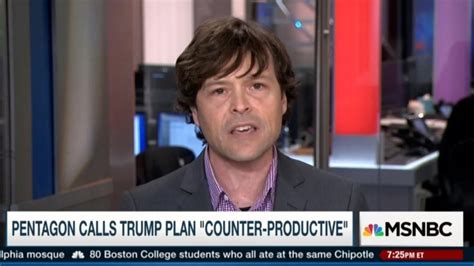A Quote by Ashleigh Banfield
Very few people are fortunate enough to walk through countries like Iran, Iraq, Syria, Lebanon, Jordan, and Saudi Arabia, and I had seen them all. I had spoken to many on the street.
Related Quotes
If you want peace and well-being to be in place in the Middle East and you want terrorism to be uprooted, then there's no path other than the presence of the Islamic Republic of Iran, you saw that in Iraq, Syria, Lebanon and Yemen that the power that was able to help the people of Iraq, Syria, Lebanon and Yemen in the face of terrorist groups was the Islamic Republic of Iran.
We are certainly seeing a greater diversification of origin... it used to be that the best trained terrorist cyber facilitators were living in Pakistan, Saudi Arabia, or Western Europe. These days, we are seeing increasing numbers of such individuals from North Africa and what I like to term "Greater Syria" - Lebanon, the Palestinian territories, Jordan, and Syria itself.
New security architecture is being laid down in the Northern Middle East, Lebanon, Syria, Iraq, in which pro-Iranian governments are consolidating their grip on the territory and they're backed by Russia, to a large degree. And this has caused great grief and consternation in Saudi Arabia and amongst many of the United States' allies, Israel, the Gulf countries, Turkey, because they see this new architecture of security and Iranian influence and Russian influence as something that's very bad for them.
If I look at the really important questions in [Middle East] region, I see Iran, where there is a strong desire for a freer society and where people are repressed by a small group of ayatollahs. I see Syria, where we can see a similar desire of the people to be free. These two countries fund Hezbollah and other terrorist organizations and are hurting our efforts in Afghanistan and have been extremely harmful in Iraq. Then I also see large, important countries such as Egypt and Saudi Arabia.
I would recommend any American who wants to understand where the government is going in the next four years of George W. Bush presidency to get a copy of her confirmation hearings before the Senate Foreign Relations Committee. It's a road map, and it's pretty frightening testimony. Their definition of where democracy should go in the Middle East doesn't include Egypt, Jordan, Saudi Arabia, Pakistan; it only includes Iraq, Iran, and Syria.
If production does not increase in Iraq in an exponential way between now and 2015, we have a very big problem, even if Saudi Arabia meets its obligations. The figures are very simple, you do not need to be an expert. It is enough to know how to do a subtraction. China will grow very quickly, India also, and even Saudi Arabia projections of the 3 Mb/day will not be enough to meet the rise of Chinese demand.
































